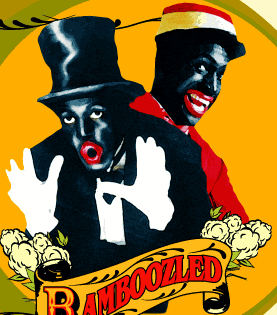 Justin
Young writes:
Justin
Young writes:
When does
"acting black" become a form of minstrelsy? That is, can you
exaggerate "blackness" to a point that it creates a hurtful,
negative stereotype? You might think about this by looking at
how the word "nigger" is used, or lampooned, in the opening
song, and throughout the movie.
 Minstrelsy
began during the Middle Ages. This phenomenon began with a single
dance performed by Thomas D. Rice. His landmark performance
of "Jim Crow" sparked an interest so strong it has captivated
white audiences for nearly two centuries.
Minstrelsy
began during the Middle Ages. This phenomenon began with a single
dance performed by Thomas D. Rice. His landmark performance
of "Jim Crow" sparked an interest so strong it has captivated
white audiences for nearly two centuries.
Soon thereafter
Minstrelsy became a profession, an event preformed by servants.
All of who were whites who painted their faces black. They harshly
imitated blacks all while juggling, telling jokes, dancing,
and acting out skits, all to make their masters or employers
laugh.
Blacks
during the time were depicted as being lazy, loud, stupid or
cumbersome, with an uncontrollable craving for Watermelon!
The intense
craving to demoralize blacks returned on the scene in the 1900's
as blacks emerged on to the silver screen. Unable to acquire
roles, which didn't require them to wear black make up, and
red lipstick, or for that matter find a dignified role, therefore
blacks of the time were forced to adhere to the white film executives.
Many can
argue that today with all the black videos, music, speech, and
comic relief, that blacks are just redefining minstrelsy. Constantly
demeaning women, poking jokes at our expense, and rapping about
money, cars, and sex one can ask how far have we really come
since the days of minstrelsy? Are we just succumbing to a reality
set for us by White America? That we have nothing to offer the
world but entertainment, and fashion? And is the outside world
sitting by laughing at us as we dance, sing and tell jokes?
White slave
owners gave "Nigger" the word to us during the America's darkest
hour. The demeaning term has remained with us up until now,
but instead of it holding its full meaning it has evolved up
to the point of acceptance within the black community.
All of
the above leads me to the conclusion that we as blacks have
evolved little since the days of minstrelsy. Were just giving
White America what they want... A show.